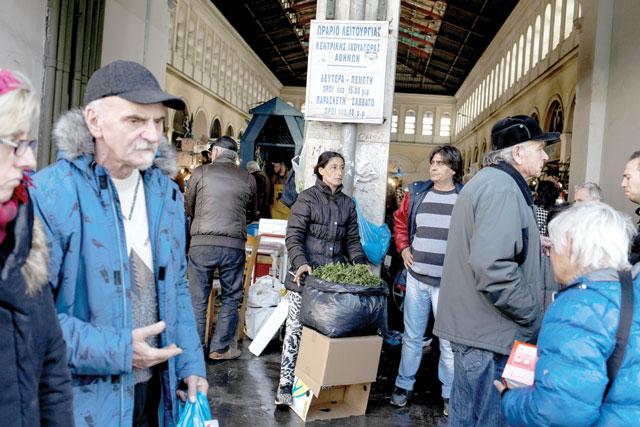You are here
Greek parliament approves austere budget for 2016
By Reuters - Dec 06,2015 - Last updated at Dec 06,2015

Greek Finance Minister Euclid Tsakalotos (left) and Greek Prime Minister Alexis Tsipras attend a parliamentary session in Athens on Saturday (AFP photo)
ATHENS — The Greek parliament approved a 2016 budget featuring sharp cuts in spending and some tax increases to satisfy the country's international lenders at a time of growing austerity fatigue.
The leftist-led government of Prime Minister Alexis Tsipras is under pressure to deliver tangible benefits to its poorest citizens after having signed to a third rescue package from eurozone governments in August worth up to 86 billion euros.
The budget makes 5.7 billion euros ($6.2 billion) in public spending cuts including 1.8 billion from pensions and 500 million from defence. The savings are greater than this year's 1.5 billion euros. It also included tax increases of just over 2 billion euros.
It was passed by 153 votes to 145 with two members absent.
"This budget is a difficult task for a government that wants to leave its mark with social justice," Tsipras told lawmakers just before the vote.
He stressed that for the first time in five years, spending on hospitals, social welfare and job creation was being increased modestly within the bailout's constraints.
Tsipras said that was possible because his government had secured greater fiscal space by reducing its primary budget surplus target before debt service to 0.5 per cent of the gross domestic product (GDP) in tough negotiations with the creditors.
The budget will have a deficit of 2.1 per cent of GDP next year compared with 0.2 per cent this year.
Tsipras' coalition majority fell to three last month after two lawmakers rebelled against a set of reforms demanded by the lenders, raising questions about his ability to push through a more ambitious long-term reform of the country's complex, under-funded pension system next month.
Representatives of the eurozone, the European Central Bank (ECB) and the International Monetary Fund (IMF) return to Greece on Monday for more talks about pending reforms of the pension and tax systems and public administration.
Having recapitalised the countries' four systemic banks at less expense to the taxpayer than expected, the government aims to complete a first review of the latest bailout programme in February in order to open promised talks on long-term debt relief from eurozone governments.
For the centre-right opposition, interim New Democracy Party leader Yiannis Plakiotakis said: "Syriza's first national budget proves that what they have been saying about social sensitivity is just a myth. The budget shows that 2016 will be much worse than 2015."
Greek Finance Minister Euclid Tsakalotos told Reuters in an interview on Saturday that a long-term commitment from eurozone partners to debt relief is crucial to restore investors' confidence in Greece and "lay the Grexit dragon to rest once and for all".
The soft-spoken leftist academic, who replaced Yanis Varoufakis in July when Greece was on the brink of being bounced out the euro, has worked to rebuild shattered trust among euro area finance ministers by faithfully implementing the country's third bailout plan.
While his predecessor had a turbulent relationship with fellow ministers, Tsakalotos has focused on building a record of delivering on undertakings made under the bailout deal more or less on schedule before presenting demands to his peers.
Even German Finance Minister Wolfgang Schaeuble, a sceptic who tried to force Greece to take a long "time out" from the eurozone at the height of the debt crisis last summer, has been heard recently to praise reform efforts and new-found cooperation between Athens and its creditors.
Asked if a Greek exit from the euro was still a risk, Tsakalotos said: "If the roadmap of the Greek government to complete the recapitalisation of the banks and complete successfully the first review of the [bailout] programme is followed, and we get a serious discussion and solution on debt, then ... I think that will lay the Grexit dragon to rest once and for all."
Consumers, businesses, depositors and investors needed long-term certainty about the sustainability of Greece's debt burden, which is expected to reach 186 per cent of annual GDP next year — to restore their confidence, he said.
Debt relief
The leftist government swept to power in January, promising to reverse years of austerity demanded by Greece's creditors that helped to push the economy into a long depression.
With Greek banks near collapse, Athens had to impose capital controls on deposit withdrawals and international transfers in July and accept creditors' demands for more austerity and reform by agreeing to the third bailout programme in August.
However, the government is continuing to press for relief on Greece's huge debt burden.
Tsakalotos hinted at the parameters of a debt relief negotiation he said was likely to start in February, saying that capping the country's annual gross funding needs by extending loan maturities and grace periods before payment of interest and principal have to begin could be a good solution.
Jeroen Dijsselbloem, who chairs meetings of eurozone finance ministers, told Reuters in October that the governments of the currency bloc agreed that Greece's debt service costs should be capped at 15 per cent of GDP a year over the long term.
Asked about that idea, Tsakalotos said: "Fifteen per cent is a very large number if it doesn't include T-bills, but if it does include T-bills it is something that is very well worth considering. So that is quite a big issue."
One source close to the creditors poured cold water on the idea. Asked if short-term treasury bill debt could be included in a country's gross funding costs when the IMF and European Union (EU) calculate its debt sustainability, the source said: "No, T-bills are not included in the financing needs calculations."
Tsakalotos accepted in principle that long-term debt relief would be conditional on continued progress on reforming the Greek economy, with monitoring by the creditors.
"It depends on the nature of the benchmarks and the nature of the conditionality," he said.
"At some point the creditors have to decide whether they trust the Greek government. Because if they do not trust the Greek government and the Greek government is always going to have to be on a tight political leash, then the implications of that are that we will never get out of the crisis," Tsakalotos added.
The IMF considers 15 per cent of GDP to be a normal debt service level for an advanced nation, but given Greece's economic weakness, an IMF source said in October that a cap of 10 per cent of GDP would be more appropriate.
Treasury bills are the government's main source of short-term funding since it was shut out of capital markets and forced to seek the bailouts.
The ECB has limited Greece's total borrowing through T-bills to 15 billion euros ($15.84 billion), about 7 per cent of GDP. That would mean the government would need to allocate another 8 per cent of GDP to service longer-term debt, close to the level envisaged by the IMF source.
Athens faces debt service costs far below the EU average until 2022 because it was granted a 10-year holiday on principal repayments on most of its debt to the eurozone in 2012, but they will spike from 2022 unless smoothed out.
Tsakalotos said locking in manageable annual debt service costs over the long term would give investors a "clear runway".
"Because if they only get a solution for one year, they will only invest for one year. If they only get a solution for two years they are only going to invest for two years," he added.
Return to growth
He forecast a return to economic growth in the second half of 2016 and a complete lifting of capital controls after a shallower-than-expected recession due to this year's political turmoil.
Asked when he thought Athens might be able to start borrowing on the bond market again, Tsakalotos said: "I don't think it's impossible by the end of 2016. I wouldn't bet my life on it but I think it's at least a 50-50 bet."
Since July, he has overseen a recapitalisation of banks hard hit by the capital controls to stop deposit flight, and pushed through seven sets of unpopular legislation required to obtain a first cash release from the eurozone creditors.
Tougher assignments lie just ahead, including a potentially explosive overhaul of Europe's most expensive pension system in the coming weeks which provoked a general strike on Thursday.
The government's parliamentary majority has shrunk to three and public tolerance for further belt-tightening is wearing very thin after the six years of austerity.
Tsakalotos said the government would nevertheless manage to pass the ambitious pension reform next month, but it aimed to avoid further pension cuts in 2016 despite a requirement in the bailout deal to save 1 per cent of GDP on pension costs next year.
Asked how he could square that circle, he said: "We will have to find savings without cuts, obviously." He declined to say if that meant raising contributions, saying he wanted to discuss the reform first with employers and trade unions.
"We really have got reform fatigue and it's absolutely critical that people start seeing some of the benefits so that the reforms do not lose momentum," Tsakalotos concluded.
Related Articles
ATHENS –– Greek lawmakers passed unpopular pension and tax reforms on Monday that a European official said marked a major advance in negotia
BRUSSELS — Greece on Monday agreed to compromise on new bailout reforms in a bid to break a deadlock with its EU- International Monetary Fun
FRANKFURT () — Eurozone ministers approved the launch of Greece bailout talks and the European Central Bank (ECB) boosted its cash lifeline

















